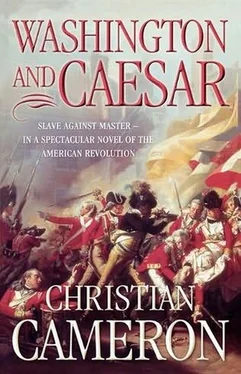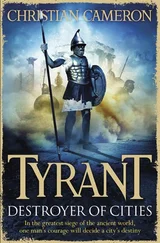Christian Cameron - Washington and Caesar
Здесь есть возможность читать онлайн «Christian Cameron - Washington and Caesar» — ознакомительный отрывок электронной книги совершенно бесплатно, а после прочтения отрывка купить полную версию. В некоторых случаях можно слушать аудио, скачать через торрент в формате fb2 и присутствует краткое содержание. Год выпуска: 0101, ISBN: 0101, Издательство: HarperCollins, Жанр: Исторические приключения, на английском языке. Описание произведения, (предисловие) а так же отзывы посетителей доступны на портале библиотеки ЛибКат.
- Название:Washington and Caesar
- Автор:
- Издательство:HarperCollins
- Жанр:
- Год:0101
- ISBN:9780007389698
- Рейтинг книги:3 / 5. Голосов: 1
-
Избранное:Добавить в избранное
- Отзывы:
-
Ваша оценка:
- 60
- 1
- 2
- 3
- 4
- 5
Washington and Caesar: краткое содержание, описание и аннотация
Предлагаем к чтению аннотацию, описание, краткое содержание или предисловие (зависит от того, что написал сам автор книги «Washington and Caesar»). Если вы не нашли необходимую информацию о книге — напишите в комментариях, мы постараемся отыскать её.
Washington and Caesar — читать онлайн ознакомительный отрывок
Ниже представлен текст книги, разбитый по страницам. Система сохранения места последней прочитанной страницы, позволяет с удобством читать онлайн бесплатно книгу «Washington and Caesar», без необходимости каждый раз заново искать на чём Вы остановились. Поставьте закладку, и сможете в любой момент перейти на страницу, на которой закончили чтение.
Интервал:
Закладка:
Polly smiled for the first time in that conversation. “That’s the Caesar I want. The one that thinks. I don’t want it all to be snatched kisses and your hand on my thigh, Caesar. I want to be talked to. I learned that equality from my father, and I’ll expect it.” She started to walk, and made a motion that he should come along. “It’s cold. I’m cold. As to after the war, what of it? We’re black, Caesar. There isn’t ever a day we’ll rest easy, knowing that the next day will bring us ease. And I don’t see you ever being a slave again.”
Caesar caught her to him and kissed her, a quick kiss on the lips, and then a longer kiss on her neck. “I’ll keep you warm, at least,” he said.
She kissed him a moment and pulled free. “New York, then,” she said, and turned back to her father’s house.
The sallow man in the bearskin coat had two more stops to make, but he thought of the black whore for the rest of the evening. She was the favorite of his post boxes, and the only one who didn’t make him cringe and feel inferior. Sometimes, when she vexed him, he hit her and liked it. She was terrified of him, and no one had ever been terrified of him before-much the reverse-and he took pleasure in that, too.
He picked up two more packages and then traveled east, carefully avoiding the post at the first line of pickets and meeting a Quaker farmer and his wife exactly on time, just as the sun rose off toward Landsdowne. The little man in the bearskin coat was especially proud when he was just on time for these meetings. He rode up cautiously, because he was always cautious, and stopped a good few paces from the wagon.
“Got any fodder to sell?” he asked. The old Quaker on the wagon frowned.
“Got any fresh fodder to sell?” he corrected himself, annoyed that the man needed so much care, but pleased that he could remember the whole phrase. The old man nodded, and indicated the back of the wagon.
The man in the bearskin coat rode back into the city when the transaction was finished, again avoiding the British post on the road, back to his dreary day-to-day life. He liked the nights when he was a courier, a secret messenger for the cause.
The Quaker farmer took his wagon through the lines with a paper signed by several commanders on both sides, selling fodder as he went. Once he was outside the range of all but the most aggressive patrols of the King’s army, he turned down a side lane past some fields that had been fallow at least a year and drove his wagon right into a barn. He no sooner pulled in there than armed men surrounded him.
“What you got for me?” asked Sergeant Bludner.
Valley Forge, February 19, 1778
Washington felt the cold right through his spirits. The capital was lost, and his army, a bare three thousand men, were camped in the hardest conditions they had yet endured. He felt that the war might now be lost through sheer neglect and a lack of basic logistics. His men might melt away, starve or die in the cold.
Washington looked at the man standing before him, able, brave, animated. The very picture of a good officer, and Washington disliked that he had to refuse the man a furlough, but the other generals had been writing passes as if they were free of threat, and with British patrols attacking his outposts every day he could not afford to have his officers absent. He feared desertion. He feared that the army would break up like an ice floe and be gone in a night.
“General, I appeal to you. I’ve worn out all my smallclothes, and I promised I would wed her by the first of the year. She’ll be eating her heart our, sir! Please let me go.”
Washington said nothing. The Massachusetts captain was dressed in the remnants of a British coat, and his boots were wrapped in rags. His hat was tied to his head with a piece of old sacking. When he gesticulated, his hand could be seen wrapped in bandages. Yet he stood straight as an arrow in front of his general.
“If I don’t go, she’ll die.”
Washington smiled thinly. “Oh, no sir. Women do not die for such trifles.”
“But, General, what shall I do?” The man was not angry at being refused, just plaintive.
“What will you do? Captain, I recommend you do as I do and write to her to add another leaf to the book of women’s sufferings.” He winced at his own tone, as he could imagine what Martha would say if she were present, but thankfully for his status as the “demigod” of the revolutionary cause, she was not.
When the captain was dismissed, Washington notified Colonel Fitzgerald that he was done with petitions for the day, and set himself to correspondence. He read a dispatch from his spymaster stating that an agent in Philadelphia with a code he recognized was confirming the movement of British troops out of the city in the spring. It was not the first report Washington had received on the subject, and he looked out of the window for a moment and considered what it would mean to his army, starving in the snow, to retake their capital, even if it were retaken only because the enemy abandoned it.
A knock at the door interrupted his reflection. Billy leaned in and indicated the marquis a little behind him. Washington beckoned.
“The marquis has a man he wishes to introduce, General,” said Billy. “I think you might want to hear him.”
Washington nodded. “Some warm punch?” he asked, and Billy vanished.
The marquis bowed elegantly and made way for a far less graceful man behind him.
“My General, may I have the pleasure of introducing Freiherr von Steuben, formerly a general in the service of the King of Prussia? Monsieur von Steuben, J’ai le plaisir d’introducer le General des Etats Unis, Monsieur George Washington. General, Freiherr von Steuben has little English.”
Rather than Lafayette’s courtly bow, von Steuben clicked his heels together and bowed stiffly from the waist.
“Votre servant, Monsieur le General,” he said. Washington’s French was not good at the best of times. Washington waved them to chairs.
“Please thank the Freiherr for coming. I am flattered to receive an officer from the Prussian King. How may I be of service?”
There was a brief conversation in French, and Lafayette smiled. “The Freiherr wishes that he may serve our army. He makes no demand for rank and says that rather than importune you for some task, it might be best if he simply joined your headquarters and watched to see if he could be of service.”
Von Steuben spoke rapidly again. Then he smiled and rose from his chair, bowed from the waist again and seated himself.
Lafayette nodded and waited until his protege had finished. “The Freiherr says that he served on the staff of the great King Frederick and also has conducted largescale…” Lafayette paused. “How do you say it, games, on the Champs de Mars?” The two foreigners looked at each other.
Washington smiled benevolently. “Military exercises?”
“Exactement. My pardon, General. I speak nothing but English for months and it improves iteself, yes? And then I have someone to speak the langue of home, and…”
“Please tell Freiherr von Steuben that I would be delighted to make a temporary place on my staff, and that he should feel free to ask me anything he likes. I will assign John Laurens to translate for him. Laurens might learn more soldiering, and you, my dear Marquis, are far too busy to be a translator, I think.”
If it was a reproof, it was a gentle one. Lafayette’s adoration of his general was sometimes a burden, and it imposed on Washington a restraint he had never used with another person, except perhaps Martha, but it was cheering, all the same.
Washington called for John Laurens and Billy served hot punch to all four men. Washington thought of the contrast between the Yankee captain to whom he had been forced to refuse a furlough and the elegant Lafayette in his new uniform and fur-lined waistcoat, and the contrast made him think of Lafayette’s unlikely friend.
Читать дальшеИнтервал:
Закладка:
Похожие книги на «Washington and Caesar»
Представляем Вашему вниманию похожие книги на «Washington and Caesar» списком для выбора. Мы отобрали схожую по названию и смыслу литературу в надежде предоставить читателям больше вариантов отыскать новые, интересные, ещё непрочитанные произведения.
Обсуждение, отзывы о книге «Washington and Caesar» и просто собственные мнения читателей. Оставьте ваши комментарии, напишите, что Вы думаете о произведении, его смысле или главных героях. Укажите что конкретно понравилось, а что нет, и почему Вы так считаете.












